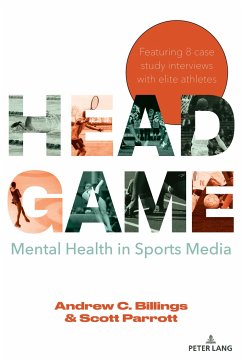We are witnessing a sea change regarding mental health in sports media. led in part by professional athletes such as Michael Phelps, Kevin Love, Naomi Osaka, and Simone Biles, who are sharing their own experiences with mental illness, bucking stereotypes in which people experiencing mental health issues are condemned to unfulfilling lives. From quarterbacks to pitchers, power forwards to Olympic swimmers, athletes are increasingly using the mass mediäincluding social mediäto share their experiences with depression, anxiety, and other disorders. Head Game: Mental Health in Sports Media uses interviews with key athletes, leading journalists and sportscasters, and organizational and league leaders to show how media has been used¿and could be used in the future¿to advance greater understanding of mental health. Professional athletes describe their own experiences with mental illness, including the challenges and opportunities they encountered in the locker room, field of play, and mass media. The athletes, who represent a spectrum of professional sports, describe their decisions to disclose as well as their recommendations for current and future generations of athletes. Head Game highlights the crucial importance of such disclosures in challenging the context of professional sport where athletes are trained to be "tough" from a young age and any mental illness could translate into reduced playing time and even harassment. "Head Game represents the first book of its kind to tackle one of today¿s most pressing public health crises, one that has been forced into the shadows for far too long, through the lens of sport. Billings and Parrott explore the key media moments in this movement, the storytellers who shaped them, the institutional response from leagues and teams, and the first-hand accounts of elite athletes who have struggled to bring mental health awareness to the forefront¿all of which has come to shape how we talk about mental health today. This timely, well-researched and expansive volume offers a powerful compilation of perspectives from prominent athletes like Olympians Michael Phelps and Gracie Gold, to the NFL¿s Brandon Bostick, to the NHL¿s Corey Hirsch. In combating the silence, stigma, stereotypes and prejudice that have often plagued discussions of mental health, Head Game tracks the modern movement for mental health advocacy within the world of sport and beyond. I highly recommend this book to anyone teaching courses in communication, sport and society, as students will undoubtedly find the material engaging and relatable, as well as to any reader interested in mental health portrayals in the media. I suspect everyone who reads Head Game will find a story within it that they can connect to." ¿Leigh Moscowitz, Professor in the School of Journalism and Mass Communications, University of South Carolina "For too long the discourse of ¿mental toughness¿ has dominated sports culture, from the way we coach and train athletes to how athletes are covered in the media. Through interviews with elite/professional athletes who have publicly disclosed mental health issues, the sports journalists who cover their stories, and sports organizations¿ own efforts to address mental health, Head Game dissects how dangerous this discourse has been, and creates much-needed awareness on an issue that has been stigmatized in our culture. Head Game humanizes athletes, reminding readers that gold medals, championships, million-dollar salaries, corporate endorsements, or super star celebrity do not immunize athletes against mental health struggles. Sadly, what is at stake is a matter of life or death. Head Game is required reading for all athletes, coaches, journalists, sports fans, or anyone who cares about the mental health and well-being of athletes." ¿Cheryl Cooky, Professor of American Studies and Women¿s, Gender, and Sexuality Studies, Purdue University
Hinweis: Dieser Artikel kann nur an eine deutsche Lieferadresse ausgeliefert werden.
Hinweis: Dieser Artikel kann nur an eine deutsche Lieferadresse ausgeliefert werden.









